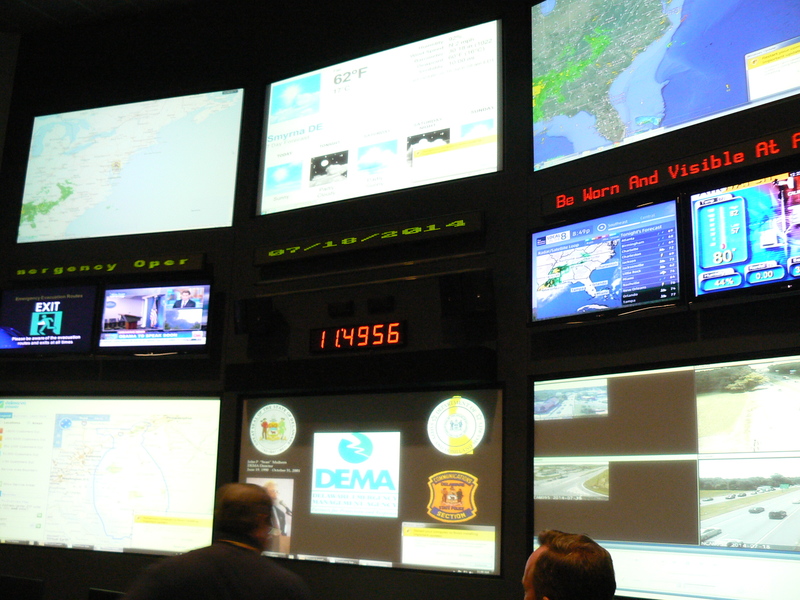DEMA hosts media day
Inside a remarkably large room, National Guard, state police and other officials fill 35 seats, starring at a wall of screens.
During an emergency, officials in this room can contact people across the state or in just a couple of houses.
Visitors at the Emergency Operations Center in Smyrna got a glimpse of emergency operations as part of the Delaware Emergency Management Agency media day July 18.
Officials in the center base judgement on information they receive from 10 large screens monitoring real-time radar, DelDOT traffic cameras, local news and national news.
Delaware Emergency Management Agency Community Relations Officer Gary Laing said the room can get very busy and tight during an emergency.
“The process is to try and manage chaos,” he said.
He added the storm tracking systems used in the center are web-based, but if those systems don't cooperate, it isn't too much of a problem.
“If we have to, we'll go down to paper and pencil. We still have noninternet-based software,” he said.
Delaware Emergency Management Agency takes charge during statewide emergencies providing resources to towns and counties during severe events such as hurricanes, snowstorms, thunderstorms or severe flooding.
Bob Harrison said it's tough to budget for disasters. Harrison is in charge of the fiscal section for the Delaware Emergency Management Agency's Incident Command System, a standardized, all hazards, incident management system used during a natural emergency.
Along with the fiscal section, within the Incident Command System there are operations, planning, and logistics sections. The system operates with someone always in charge, known as the incident commander,
The fiscal section tracks expenditures during disasters and verifies and coordinates responses to requests for assistance from municipalities.
Acting operations chief and military veteran Kevin Killie says his section keeps the flow of operations during a disaster. If cities such as Rehoboth Beach need sand bags for an upcoming storm, the operations section would make sure the logistics section provides them; Rehoboth would pay for them, Killie said.
The planning section, headed by retired military veteran Tony Lee concentrates on the what-ifs of a situation and carefully tracks potential storms and hurricanes using radar. Lee said the planning section takes storms very seriously, noting the devastation Hurricane Sandy brought to New Jersey nearly hit Delaware instead.
While the Delaware Emergency Management Agency provides resources like trucks, helicopters and other utilities and takes charge in times of natural disasters for the state of Delaware, they do not step in unless asked by local municipalities.
“All emergencies begin at the local level,” said Laing. He said if towns or counties ask for help, Delaware Emergency Management Agency will step in.
It is not uncommon, Laing said, that contracts for equipment such as vehicles, sandbags, or plows are negotiated within Delaware or with other states during times of emergencies.
Laing encourages people to like the Agency's Facebook page and follow its Twitter page, both offering updates during emergencies. The Delaware Emergency Management Agency also offers courses to the public on the Incident Command System and Hurricane Readiness among others.





















































